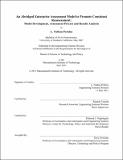An abridged enterprise assessment model to promote consistent reassessment : model development, assessment process and results analysis
Author(s)
Perkins, L. Nathan (Lewis Nathan)
DownloadFull printable version (5.659Mb)
Other Contributors
Massachusetts Institute of Technology. Technology and Policy Program.
Advisor
Ricardo Valerdi and Deborah J. Nightingale.
Terms of use
Metadata
Show full item recordAbstract
Enterprise assessment is increasingly important, both as a cross-time and cross-industry measurement and as a guiding force in enterprise transformation. Assessments provide crucial information about strengths, areas for improvement and potential investment strategies for achieving performance benefits. As performance is being recognized as a complex and multifaceted construct, assessment tools seek to incorporate and reflect a holistic measurement of performance across multiple dimensions such as stakeholder value, leadership, culture and quality. The Lean Enterprise Self-Assessment Tool (LESAT) is one such enterprise assessment tool that closely ties into a clearly defined enterprise transformation framework and roadmap. Ideal use of assessment involves regular reassessment of 54 practices and continual feedback, but due to the resource and time commitment required to perform assessment, this iterative process is deprioritized. In order to facilitate and promote regular reassessment, we demonstrate a methodology for creating an abridged assessment tool. By creating a predictive model based on the unidemnsionality of LESAT, a small selection of highly indicative practices is used to predict the remaining practices. Based on these predictions, respondents assess follow-up practices selected to target high-priority areas for improvement. Using this approach, we are able to create an abridged LESAT that assesses six of the original 54 practices for the predictive model and an additional twelve dynamically selected practices to target high-priority areas. Based on training data and novel testing data (271 respondents from 24 companies), we validate the accuracy of the predictive model and show that high-priority areas are correctly identified over 90% of the time. The abridged LESAT shows promise as a way to reassess, with significantly lower time and resource commitment normally required. We review the practical applications of the abridged LESAT and present a revised recommended process for assessment and for evaluation of results. The revised process seeks to articulate how the new assessment tool can be practically applied in the context of an ongoing enterprise transformation.
Description
Thesis (S.M. in Technology and Policy)--Massachusetts Institute of Technology, Engineering Systems Division, Technology and Policy Program, 2011. This electronic version was submitted by the student author. The certified thesis is available in the Institute Archives and Special Collections. Cataloged from student submitted PDF version of thesis. Includes bibliographical references (p. 136-140).
Date issued
2011Department
Massachusetts Institute of Technology. Engineering Systems DivisionPublisher
Massachusetts Institute of Technology
Keywords
Engineering Systems Division., Technology and Policy Program.